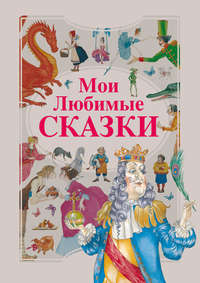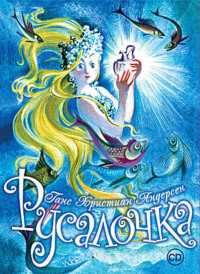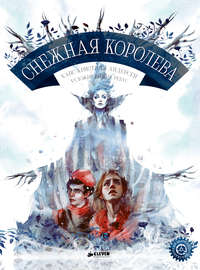 полная версия
полная версияWhat the Moon Saw: and Other Tales
"That must be some subordinate species," he said. "I don't know it. It's not included in any system."
"Not included in any system!" repeated the thistles and the nettles.
The great trees that stood round about saw and heard it; but they said not a word, good or bad, which is the wisest thing to do for people who are stupid.
There came through the forest a poor innocent girl. Her heart was pure, and her understanding was enlarged by faith. Her whole inheritance was an old Bible; but out of its pages a voice said to her, "If people wish to do us evil, remember how it was said of Joseph. They imagined evil in their hearts, but God turned it to good. If we suffer wrong – if we are misunderstood and despised – then we may recall the words of Him who was purity and goodness itself, and who forgave and prayed for those who buffeted Him and nailed Him to the cross." The girl stood still in front of the wonderful plant, whose great leaves exhaled a sweet and refreshing fragrance, and whose flowers glittered like a coloured flame in the sun; and from each flower there came a sound as though it concealed within itself a deep fount of melody that thousands of years could not exhaust. With pious gratitude the girl looked on this beautiful work of the Creator, and bent down one of the branches towards herself to breathe in its sweetness; and a light arose in her soul. It seemed to do her heart good; and gladly would she have plucked a flower, but she could not make up her mind to break one off, for it would soon fade if she did so. Therefore the girl only took a single leaf, and laid it in her Bible at home; and it lay there quite fresh, always green, and never fading.
Among the pages of the Bible it was kept; and, with the Bible, it was laid under the young girl's head when, a few weeks afterwards, she lay in her coffin, with the solemn calm of death on her gentle face, as if the earthly remains bore the impress of the truth that she now stood before her Creator.
But the wonderful plant still bloomed without in the forest. It was almost like a tree to look upon; and all the birds of passage bowed before it.
"That's giving itself foreign airs now," said the thistles and the burdocks; "we never behave like that here."
And the black snails actually spat at the flower.
Then came the swineherd. He was collecting thistles and shrubs, to burn them for the ashes. The wonderful plant was placed bodily in his bundle.
"It shall be made useful," he said; and so said, so done.
But soon afterwards, the king of the country was troubled with a terrible depression of spirits. He was busy and industrious, but that did him no good. They read him deep and learned books, and then they read from the lightest and most superficial that they could find; but it was of no use. Then one of the wise men of the world, to whom they had applied, sent a messenger to tell the king that there was one remedy to give him relief and to cure him. He said:
"In the king's own country there grows in a forest a plant of heavenly origin. Its appearance is thus and thus. It cannot be mistaken."
"I fancy it was taken up in my bundle, and burnt to ashes long ago," said the swineherd; "but I did not know any better."
"You didn't know any better! Ignorance of ignorances!"
And those words the swineherd might well take to himself, for they were meant for him, and for no one else.
Not another leaf was to be found; the only one lay in the coffin of the dead girl, and no one knew anything about that.
And the king himself, in his melancholy, wandered out to the spot in the wood.
"Here is where the plant stood," he said; "it is a sacred place."
And the place was surrounded with a golden railing, and a sentry was posted there.
The botanical professor wrote a long treatise upon the heavenly plant. For this he was gilded all over, and this gilding suited him and his family very well. And indeed that was the most agreeable part of the whole story. But the king remained as low-spirited as before; but that he had always been, at least so the sentry said.
THE DUMB BOOK
By the high-road in the forest lay a lonely peasant's hut; the road went right through the farmyard. The sun shone down, and all the windows were open. In the house was bustle and movement; but in the garden, in an arbour of blossoming elder, stood an open coffin. A dead man had been carried out here, and he was to be buried this morning. Nobody stood by the coffin and looked sorrowfully at the dead man; no one shed a tear for him: his face was covered with a white cloth, and under his head lay a great thick book, whose leaves consisted of whole sheets of blotting paper, and on each leaf lay a faded flower. It was a complete herbanum, gathered by him in various places; it was to be buried with him, for so he had wished it. With each flower a chapter in his life was associated.
"Who is the dead man?" we asked; and the answer was:
"The Old Student. They say he was once a brisk lad, and studied the old languages, and sang, and even wrote poems. Then something happened to him that made him turn his thoughts to brandy, and take to it; and when at last he had ruined his health, he came out here into the country, where somebody paid for his board and lodging. He was as gentle as a child, except when the dark mood came upon him; but when it came he became like a giant, and then ran about in the woods like a hunted stag; but when we once got him home again, and prevailed with him so far that he opened the book with the dried plants, he often sat whole days, and looked sometimes at one plant and sometimes at another, and at times the tears rolled over his cheeks: Heaven knows what he was thinking of. But he begged us to put the book into the coffin, and now he lies there, and in a little while the lid will be nailed down, and he will have his quiet rest in the grave."
The face-cloth was raised, and there was peace upon the features of the dead man, and a sunbeam played upon it; a swallow shot with arrowy flight into the arbour, and turned rapidly, and twittered over the dead man's head.
What a strange feeling it is – and we have doubtless all experienced it – that of turning over old letters of the days of our youth! a new life seems to come up with them, with all its hopes and sorrows. How many persons with whom we were intimate in those days, are as it were dead to us! and yet they are alive, but for a long time we have not thought of them – of them whom we then thought to hold fast for ages, and with whom we were to share sorrow and joy.
Here the withered oak-leaf in the book reminded the owner of the friend, the school-fellow, who was to be a friend for life: he fastened the green leaf in the student's cap in the green wood, when the bond was made "for life: " where does he live now? The leaf is preserved, but the friendship has perished! And here is a foreign hothouse plant, too delicate for the gardens of the North; the leaves almost seem to keep their fragrance still. She gave it to him, the young lady in the nobleman's garden. Here is the water rose, which he plucked himself, and moistened with salt tears – the roses of the sweet waters. And here is a nettle – what tale may its leaves have to tell? What were his thoughts when he plucked it and kept it? Here is a lily of the valley, from the solitudes of the forest. Here's an evergreen from the flower-pot of the tavern; and here's a naked sharp blade of grass.
The blooming elder waves its fresh fragrant blossoms over the dead man's head, and the swallow flies past again. "Pee-wit! pee-wit!" And now the men come with nails and hammers, and the lid is laid over the dead man, that his head may rest upon the dumb book – vanished and scattered!
THE JEWISH GIRL
Among the children in a charity school sat a little Jewish girl. She was a good, intelligent child, the quickest in all the school; but she had to be excluded from one lesson, for she was not allowed to take part in the scripture-lesson, for it was a Christian school.
In that hour the girl was allowed to open the geography book, or to do her sum for the next day; but that was soon done; and when she had mastered her lesson in geography, the book indeed remained open before her, but the little one read no more in it; she listened silently to the words of the Christian teacher, who soon became aware that she was listening more intently than almost any of the other children.
"Read your book, Sara," the teacher said, in mild reproof; but her dark beaming eye remained fixed upon him; and once when he addressed a question to her, she knew how to answer better than any of the others could have done. She had heard and understood, and had kept his words in her heart.
When her father, a poor honest man, first brought the girl to the school, he had stipulated that she should be excluded from the lessons on the Christian faith. But it would have caused disturbance, and perhaps might have awakened discontent in the minds of the others, if she had been sent from the room during the hours in question, and consequently she stayed; but this could not go on any longer.
The teacher betook himself to the father, and exhorted him either to remove his daughter from the school, or to consent that Sara should become a Christian.
"I can no longer be a silent spectator of the gleaming eyes of the child, and of her deep and earnest longing for the words of the Gospel," said the teacher.
Then the father burst into tears.
"I know but little of the commandment given to my fathers," he said; "but Sara's mother was steadfast in the faith, a true daughter of Israel, and I vowed to her as she lay dying that our child should never be baptized. I must keep my vow, for it is even as a covenant with God Himself."
And accordingly the little Jewish maiden quitted the Christian school.
Years have rolled on.
In one of the smallest provincial towns there dwelt, as a servant in a humble household, a maiden who held the Mosaic faith. Her hair was black as ebony, her eye dark as night, and yet full of splendour and light, as is usual with the daughters of Israel. It was Sara. The expression in the countenance of the now grown-up maiden was still that of the child sitting upon the school-room bench and listening with thoughtful eyes to the words of the Christian teacher.
Every Sunday there pealed from the church the sounds of the organ and the song of the congregation. The strains penetrated into the house where the Jewish girl, industrious and faithful in all things, stood at her work.
"Thou shalt keep holy the Sabbath-day," said a voice within her, the voice of the Law; but her Sabbath-day was a working day among the Christians, and that seemed unfortunate to her. But then the thought arose in her soul: "Doth God reckon by days and hours?" And when this thought grew strong within her, it seemed a comfort that on the Sunday of the Christians the hour of prayer remained undisturbed; and when the sound of the organ and the songs of the congregation sounded across to her as she stood in the kitchen at her work, then even that place seemed to become a sacred one to her. Then she would read in the Old Testament, the treasure and comfort of her people, and it was only in this one she could read; for she kept faithfully in the depths of her heart the words the teacher had spoken when she left the school, and the promise her father had given to her dying mother, that she should never receive Christian baptism, or deny the faith of her ancestors. The New Testament was to be a sealed book to her; and yet she knew much of it, and the Gospel echoed faintly among the recollections of her youth.
One evening she was sitting in a corner of the living-room. Her master was reading aloud; and she might listen to him, for it was not the Gospel that he read, but an old story-book, therefore she might stay. The book told of a Hungarian knight who was taken prisoner by a Turkish pasha, who caused him to be yoked with his oxen to the plough, and driven with blows of the whip till the blood came, and he almost sank under the pain and ignominy he endured. The faithful wife of the knight at home parted with all her jewels, and pledged castle and land. The knight's friends amassed large sums, for the ransom demanded was almost unattainably high: but it was collected at last, and the knight was freed from servitude and misery. Sick and exhausted, he reached his home. But soon another summons came to war against the foes of Christianity: the knight heard the cry, and he could stay no longer, for he had neither peace nor rest. He caused himself to be lifted on his war-horse; and the blood came back to his cheek, his strength appeared to return, and he went forth to battle and to victory. The very same pasha who had yoked him to the plough became his prisoner, and was dragged to his castle. But not an hour had passed when the knight stood before the captive pasha, and said to him:
"What dost thou suppose awaiteth thee?"
"I know it," replied the Turk. "Retribution."
"Yes, the retribution of the Christian!" resumed the knight. "The doctrine of Christ commands us to forgive our enemies, and to love our fellow-man, for it teaches us that God is love. Depart in peace, depart to thy home: I will restore thee to thy dear ones; but in future be mild and merciful to all who are unfortunate."
Then the prisoner broke out into tears, and exclaimed:
"How could I believe in the possibility of such mercy! Misery and torment seemed to await me, they seemed inevitable; therefore I took poison, which I secretly carried about me, and in a few hours its effects will slay me. I must die – there is no remedy! But before I die, do thou expound to me the teaching which includes so great a measure of love and mercy, for it is great and godlike! Grant me to hear this teaching, and to die a Christian!" And his prayer was fulfilled.
That was the legend which the master read out of the old story-book. All the audience listened with sympathy and pleasure; but Sara, the Jewish girl, sitting alone in her corner, listened with a burning heart; great tears came into her gleaming black eyes, and she sat there with a gentle and lowly spirit as she had once sat on the school bench, and felt the grandeur of the Gospel; and the tears rolled down over her cheeks.
But again the dying words of her mother rose up within her:
"Let not my daughter become a Christian," the voice cried; and together with it arose the word of the Law: "Thou shalt honour thy father and thy mother."
"I am not admitted into the community of the Christians," she said; "they abuse me for being a Jew girl – our neighbour's boys hooted me last Sunday, when I stood at the open church-door, and looked in at the flaming candles on the altar, and listened to the song of the congregation. Ever since I sat upon the school bench I have felt the force of Christianity, a force like that of a sunbeam, which streams into my soul, however firmly I may shut my eyes against it. But I will not pain thee in thy grave, O my mother, I will not be unfaithful to the oath of my father, I will not read the Bible of the Christians. I have the religion of my people, and to that will I hold!"
And years rolled on again.
The master died. His widow fell into poverty; and the servant girl was to be dismissed. But Sara refused to leave the house: she became the staff in time of trouble, and kept the household together, working till late in the night to earn the daily bread through the labour of her hands; for no relative came forward to assist the family, and the widow become weaker every day, and lay for months together on the bed of sickness. Sara worked hard, and in the intervals sat kindly ministering by the sick-bed: she was gentle and pious, an angel of blessing in the poverty-stricken house.
"Yonder on the table lies the Bible," said the sick woman to Sara. "Read me something from it, for the night appears to be so long – oh, so long! – and my soul thirsts for the word of the Lord."
And Sara bowed her head. She took the book, and folded her hands over the Bible of the Christians, and opened it, and read to the sick woman. Tears stood in her eyes, which gleamed and shone with ecstacy, and light shone in her heart.
"O my mother," she whispered to herself; "thy child may not receive the baptism of the Christians, or be admitted into the congregation – thou hast willed it so, and I shall respect thy command: we will remain in union together here on earth; but beyond this earth there is a higher union, even union in God! He will be at our side, and lead us through the valley of death. It is He that descendeth upon the earth when it is athirst, and covers it with fruitfulness. I understand it – I know not how I came to learn the truth; but it is through Him, through Christ!"
And she started as she pronounced the sacred name, and there came upon her a baptism as of flames of fire, and her frame shook, and her limbs tottered so that she sank down fainting, weaker even than the sick woman by whose couch she had watched.
"Poor Sara!" said the people; "she is overcome with night watching and toil!"
They carried her out into the hospital for the sick poor. There she died; and from thence they carried her to the grave, but not to the churchyard of the Christians, for yonder was no room for the Jewish girl; outside, by the wall, her grave was dug.
But God's sun, that shines upon the graves of the Christians, throws its beams also upon the grave of the Jewish girl beyond the wall; and when the psalms are sung in the churchyard of the Christians, they echo likewise over her lonely resting-place; and she who sleeps beneath is included in the call to the resurrection, in the name of Him who spake to his disciples:
"John baptized you with water, but I will baptize you with the Holy Ghost!"
THE THORNY ROAD OF HONOUR
An old story yet lives of the "Thorny Road of Honour," of a marksman, who indeed attained to rank and office, but only after a lifelong and weary strife against difficulties. Who has not, in reading this story, thought of his own strife, and of his own numerous "difficulties?" The story is very closely akin to reality; but still it has its harmonious explanation here on earth, while reality often points beyond the confines of life to the regions of eternity. The history of the world is like a magic lantern that displays to us, in light pictures upon the dark ground of the present, how the benefactors of mankind, the martyrs of genius, wandered along the thorny road of honour.
From all periods, and from every country, these shining pictures display themselves to us; each only appears for a few moments, but each represents a whole life, sometimes a whole age, with its conflicts and victories. Let us contemplate here and there one of the company of martyrs – the company which will receive new members until the world itself shall pass away.
We look down upon a crowded amphitheatre. Out of the "Clouds" of Aristophanes, satire and humour are pouring down in streams upon the audience; on the stage Socrates, the most remarkable man in Athens, he who had been the shield and defence of the people against the thirty tyrants, is held up mentally and bodily to ridicule – Socrates, who saved Alcibiades and Xenophon in the turmoil of battle, and whose genius soared far above the gods of the ancients. He himself is present; he has risen from the spectator's bench, and has stepped forward, that the laughing Athenians may well appreciate the likeness between himself and the caricature on the stage: there he stands before them, towering high above them all.
Thou juicy, green, poisonous hemlock, throw thy shadow over Athens – not thou, olive tree of fame!
Seven cities contended for the honour of giving birth to Homer – that is to say, they contended after his death! Let us look at him as he was in his lifetime. He wanders on foot through the cities, and recites his verses for a livelihood; the thought for the morrow turns his hair grey! He, the great seer, is blind, and painfully pursues his way – the sharp thorn tears the mantle of the king of poets. His song yet lives, and through that alone live all the heroes and gods of antiquity.
One picture after another springs up from the east, from the west, far removed from each other in time and place, and yet each one forming a portion of the thorny road of honour, on which the thistle indeed displays a flower, but only to adorn the grave.
The camels pass along under the palm trees; they are richly laden with indigo and other treasures of price, sent by the ruler of the land to him whose songs are the delight of the people, the fame of the country: he whom envy and falsehood have driven into exile has been found, and the caravan approaches the little town in which he has taken refuge. A poor corpse is carried out of the town-gate, and the funeral procession causes the caravan to halt. The dead man is he whom they have been sent to seek – Firdusi – who has wandered the thorny road of honour even to the end.
The African, with blunt features, thick lips, and woolly hair, sits on the marble steps of the palace in the capital of Portugal, and begs: he is the submissive slave of Camoens, and but for him, and for the copper coins thrown to him by the passers by, his master, the poet of the "Lusiad," would die of hunger. Now, a costly monument marks the grave of Camoens.
There is a new picture.
Behind the iron grating a man appears, pale as death, with long unkempt beard.
"I have made a discovery," he says, "the greatest that has been made for centuries; and they have kept me locked up here for more than twenty years!"
"Who is the man?
"A madman," replies the keeper of the madhouse. "What whimsical ideas these lunatics have! He imagines that one can propel things by means of steam. It is Solomon de Cares, the discoverer of the power of steam, whose theory, expressed in dark words, is not understood by Richelieu – and he dies in the madhouse!"
Here stands Columbus, whom the street boys used once to follow and jeer, because he wanted to discover a new world – and he has discovered it. Shouts of joy greet him from the breasts of all, and the clash of bells sounds to celebrate his triumphant return; but the clash of the bells of envy soon drowns the others. The discoverer of a world, he who lifted the American gold land from the sea, and gave it to his king – he is rewarded with iron chains. He wishes that these chains may be placed in his coffin, for they witness of the world, and of the way in which a man's contemporaries reward good service.
One picture after another comes crowding on; the thorny path of honour and of fame is over-filled.
Here in dark night sits the man who measured the mountains in the moon; he who forced his way out into the endless space, among stars and planets; he, the mighty man who understood the spirit of nature, and felt the earth moving beneath his feet – Galileo. Blind and deaf he sits – an old man thrust through with the spear of suffering, and amid the torments of neglect, scarcely able to lift his foot – that foot with which, in the anguish of his soul, when men denied the truth, he stamped upon the ground with the exclamation, "Yet it moves!"
Here stands a woman of childlike mind, yet full of faith and inspiration; she carries the banner in front of the combating army, and brings victory and salvation to her fatherland. The sound of shouting arises, and the pile flames up: they are burning the witch, Joan of Arc. Yes, and a future century jeers at the white lily. Voltaire, the satyr of human intellect, writes "La Pucelle."
At the Thing or assembly at Viborg, the Danish nobles burn the laws of the king – they flame up high, illuminating the period and the lawgiver, and throw a glory into the dark prison tower, where an old man is growing grey and bent. With his finger he marks out a groove in the stone table. It is the popular king who sits there, once the ruler of three kingdoms, the friend of the citizen and the peasant: it is Christian the Second. Enemies wrote his history. Let us remember his improvements of seven and twenty years, if we cannot forget his crime.
A ship sails away, quitting the Danish shores; a man leans against the mast, casting a last glance towards the Island Hueen. It is Tycho Brahé. He raised the name of Denmark to the stars, and was rewarded with injury, loss, and sorrow. He is going to a strange country.









